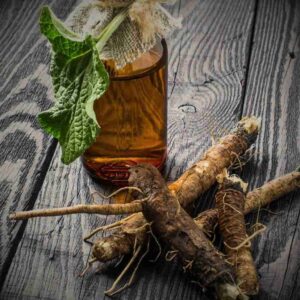Jute leaves, also known as saluyot or molokhia, are leafy greens that pack a nutritional punch. These dark green leaves are highly popular in Asian and Middle Eastern cuisines due to their earthy flavor and numerous health benefits. Rich in vitamins A, C, and E, jute leaves are excellent for boosting immune function and promoting healthy skin. They are also packed with minerals such as iron, calcium, and potassium, making them a great choice for maintaining overall health. In many countries, jute leaves are used to make a nutritious soup or stew. The leaves are usually simmered with flavorful ingredients like onions, tomatoes, and spices to create a delicious and hearty dish. Jute leaves can also be sautéed with garlic and olive oil for a simple yet nutritious side dish. Not only are jute leaves delicious and nutritious, but they are also easy to grow at home in a vegetable garden. With proper care and maintenance, you can enjoy a steady supply of fresh jute leaves throughout the growing season. Whether cooked into a flavorful curry or used raw in a salad, jute leaves are a versatile ingredient that can elevate any dish.
Discover the Nutritional Benefits of Jute Leaves
Jute leaves, also known as saluyot or ewedu, are leafy greens packed with essential nutrients that offer numerous health benefits. These dark green leaves are rich in vitamins A, C, and E, as well as minerals like iron, calcium, and potassium. Jute leaves are also a good source of dietary fiber, which promotes digestive health and helps to regulate blood sugar levels. The nutritional benefits of jute leaves include boosting immunity, improving vision, maintaining healthy skin, and supporting overall well-being. Consuming jute leaves regularly can aid in weight management, reduce inflammation, and lower the risk of chronic diseases such as heart disease and diabetes. Jute leaves can be incorporated into a variety of dishes, such as soups, stews, salads, and smoothies. Including these nutritious greens in your diet can help you reap the many health benefits they offer.
Discover the Nutritional Power of Jute Leaves
Jute leaves, also known as saluyot leaves, are a highly nutritious and versatile green leafy vegetable that is often overlooked. These leaves are packed with essential nutrients that can benefit your overall health and well-being. From offering a good source of vitamins A, C, and E to being rich in minerals such as iron, calcium, and potassium, jute leaves can be a valuable addition to your diet. One of the key nutritional benefits of jute leaves is their high fiber content, which can aid digestion and promote gut health. Additionally, jute leaves are known for their antioxidant properties, which help protect the body from oxidative stress and inflammation. Incorporating jute leaves into your meals can help boost your immune system and support a healthy heart. In many cultures, jute leaves are commonly used in cooking as a leafy green vegetable. They can be added to soups, stews, stir-fries, and salads, providing a unique flavor and texture to dishes. Whether consumed fresh or cooked, jute leaves offer a refreshing and nutrient-dense addition to any meal. In conclusion, exploring the nutritional power of jute leaves can be a great way to enhance your diet with a range of essential nutrients. Consider incorporating these versatile and beneficial leaves into your culinary repertoire to experience their health-boosting properties firsthand.
Exploring the Nutritional Benefits of Jute Leaves
| Jute Leaves |
|---|
| Nutrient |
| Benefits |
| Culinary Uses |
FAQ
FAQs About Jute Leaves

Q: What are jute leaves?
A: Jute leaves are dark green, leafy vegetables that come from the plant Corchorus olitorius. They are commonly used in various culinary dishes in certain regions of the world.
Q: What do jute leaves taste like?
A: Jute leaves have a mild, slightly bitter flavor similar to spinach or kale. They are versatile and can be used in a variety of dishes.
Q: Are jute leaves nutritious?
A: Yes, jute leaves are highly nutritious and are rich in vitamins A, C, E, and K, as well as minerals like calcium, iron, and potassium. They are also a good source of dietary fiber.
Q: How are jute leaves used in cooking?
A: Jute leaves are often used in soups, stews, curries, and salads. They can be sautéed, steamed, or blended into smoothies. The leaves are generally cooked before consumption.
Q: Where can I buy jute leaves?
A: Jute leaves can be found in some specialty or Asian grocery stores, as well as farmers’ markets in regions where they are commonly used. They may also be available in dried or frozen form.
Q: How should jute leaves be stored?
A: Fresh jute leaves should be stored in the refrigerator in a plastic bag or container to maintain freshness. They can also be blanched and frozen for longer storage.
Q: Are there any health benefits of consuming jute leaves?
A: Yes, jute leaves are considered to have various health benefits, such as supporting digestion, boosting immunity, and promoting healthy skin and hair. They are also believed to have anti-inflammatory properties.
Q: Are there any precautions to take when consuming jute leaves?
A: Some people may experience digestive issues or allergies when consuming jute leaves. It’s advisable to start with small amounts to see how your body reacts. If you have any concerns or medical conditions, consult a healthcare provider before adding jute leaves to your diet.
- Cat Palm vs Majesty Palm: Which Should You Choose? - June 30, 2024
- Flowers That Survive Winter: Discover the Exceptional No. 5 - June 30, 2024
- The Ultimate Guide to the Growth and Care of the Black Pagoda Lipstick Plant - June 29, 2024





